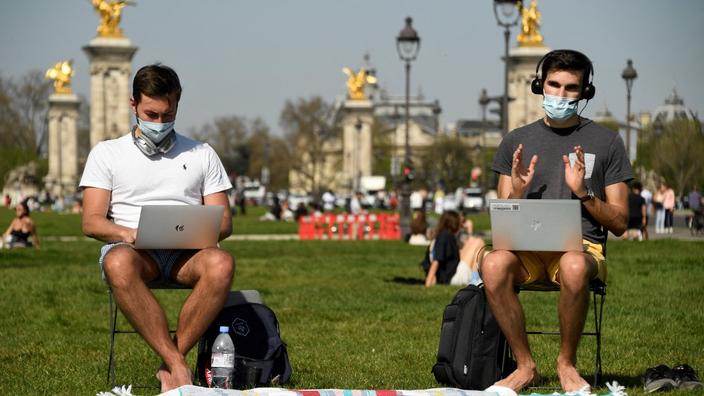Spring is not over yet as 35 degrees have been exceeded in many regions in France.
A particularly early heat wave that pushes some employees to swap their work clothes for Bermuda shorts and a pair of flip flops.
A temptation all the more present with the generalization of teleworking, more than one have become accustomed to casual outfits.
In the future, could suits and suits stay in the closet?
Read also: "I do not want to return to the office": these employees desperate to stay telework
“
The halo under the arms in an interview doesn't do it
” laughs Yves *, recruiting officer in a home help agency in Marseille.
The young employee would like to dress in a lighter way to avoid these inconveniences but his company does not allow it: "
I have to respect the internal regulations so no shorts, sneakers, jeans and t-shirt
" he explains, annoyed.
The home agency that employs her is keen to preserve her image of seriousness and professionalism, which she said was deteriorating too relaxed.
"People come as they are"
Constraints that Julian, a system optimization engineer, does not know.
In the start-up where he works, the question of work attire simply does not arise.
"
People come as they are
" shares the young man who had not even noticed that his colleague was wearing shorts.
In his company, the 13 employees are all under 30, which would explain a certain flexibility in clothing.
In spite of everything, certain red lines remain: "
still not the flip-flops"
estimates the engineer.
A relaxation in some profiles
For Jeanne, head of human resources in the medical technology sector, a "
relaxation
" in clothing is observed especially in "
certain teams
", especially among "
Tech, IT
"
profiles
who have long been eager to come. in "
sweat, limit jogging
". A relaxation that teleworking has accentuated, according to the manager, "
everyone says it openly in the teams, behind their screens, people are in shorts
". However, if certain freedoms are taken by employees, the hierarchical superiors for their part, keep the more traditional outfits "
at the head office in Levallois, nothing changes
" observes Jeanne.
SEE ALSO -
Misconception: "Employees are less efficient at teleworking"
Customer report and internal regulations
Could employers annoyed by this loosening fire a particularly stubborn employee?
Strictly speaking, there is no law prohibiting the wearing of shorts or flip flops at work, but it is in practice that things get complicated.
Unlike the entrepreneurial freedom often invoked by employers, "
the fact of dressing is not a fundamental freedom
" explains Master Eva Touboul.
For the lawyer specializing in labor law, two elements are decisive in this kind of case: "
you have to
check
the employee's relationship with customers and see what the internal regulations may specify
".
Read also: Teleworking: between quality of life and return to the office, employees are looking for the ideal pace
In fact, for a salesperson, inappropriate clothing can affect a customer's confidence and therefore have a strong impact on the productivity of the company.
As for the internal regulations, these are normally signed by the employee with the employment contract.
More simply, to take no risk vis-à-vis her employer and better understand the spirit of jurisprudence, Eva Touboul invites employees to ask themselves this question "
Is my outfit going to undermine the company image ?
".
A question that leaves plenty of room for interpretation and that employees can ask themselves at leisure when they leave for work.
* At the request of the interviewees, the first names have been changed.





/cloudfront-eu-central-1.images.arcpublishing.com/prisa/C7G3HFF74NCTBKHTVYSAHBAAZM.jpg)









